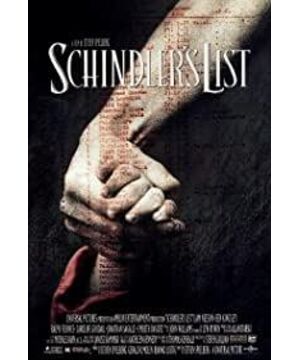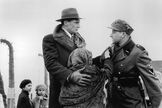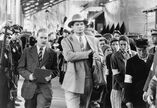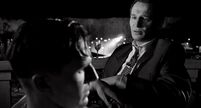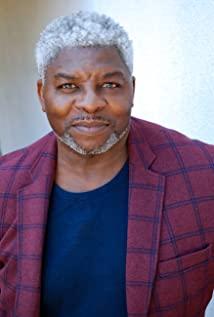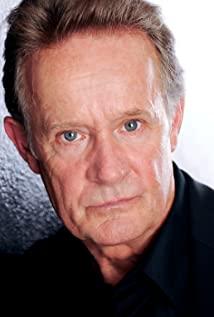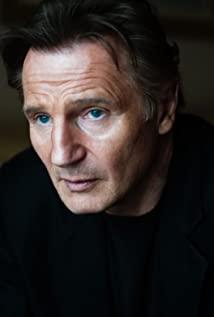——Steven Spielberg,
"Schindler's List" tells the story of the suffering of Jews during World War II through the eyes of a German businessman, and at the same time, the story makes money from Schindler's career Expand to the line of "earning people". This is a subject that has been filmed badly, but Spielberg makes this film extremely sharp. There is no roaring arrogance of war, and the music does not have grand and deliberate rendering power. Everything is carried out naturally in a "peaceful" atmosphere with planned steps. Naturally disturbing. Realism without lack of twists and turns, the combination of art and reality, social and racial contradictions and even Schindler's contradiction transformation process are the special and main factors that make this black and white film shine. Cruelty is the key word of this film, and Schindler's deeds allow its meaning to be fully digested in people's other stomachs unconsciously, and the communication between the camera and the audience reaches a delicate height.
As a real-life legend, Schindler wasn't portrayed as a typical hero from the start, compared to other films with the same bias. Instead, he started out as an ordinary German businessman with aristocratic temperament and business acumen. A straight nose and elegant demeanor, a low and calm voice, and many lovers add to the icing on the cake for a business run by his natural business acumen. As he himself said, he was a man who made his fortune by war. Jews who no one dared to use because of the political turmoil were the cheapest labor at the time, and he used them and made a fortune; obsessively obtaining supplies from Jews (which was illegal at the time) made The production cost is minimized while the quality is in an advantageous position (I personally think that after the prohibition of Jewish buying and selling, the Poles conducted a commercial monopoly without competitors, which violated the principle of market economy, and arbitrarily raised prices in order to maximize profits, but the quality was not. No guarantee), prominent in the industry; he even acquired a Jewish factory, whose original owner became his accountant, both to ensure the accountant's loyalty and to reduce costs. And all of these bold decisions were not reckless. He spent large sums of money bribing military officers and politicians, showing that he deeply understands the basic relationship between economics and politics and their environment. This, combined with his flawless negotiating skills at countless critical moments, freed Stern and more Jews afterward. In any case, he had an inseparable relationship with the Jews from the very beginning. However, in the course of his career advancement, the situation of the Jewish destiny has been declining, and the atmosphere has been in a state of turmoil and unease.
The success of Schindler's image in the film is that the fusion of his destiny with the Jewish people is carried out subtly in the change of his commercial production strategy, and the motivation is gradually shifted. The meeting with the poor old man with the broken arm, Lowenstein, was in a sense the curtain on which Schindler began to turn inadvertently.
Lowenstein came to Schindler's office to say thanks, reverently and gratefully. Although Schindler politely greeted him, he fought back his anger and confusion at the smart accountant Stern, emphasizing "Don't ever do that to me again...what is his use?" The next day, Lowenstein was cleaning snow At the same time, because the skilled workers were stopped on the way, Schindler stopped production for a day. He was furious, "lost a worker...quite skilled". It is not excluded here that as a boss, he will describe the degree of damage to his own interests to the greatest extent when striving for his own interests. At the same time, the camera stayed on his resolute and serious face for a full 4 seconds (as if waiting for people to think of something), which was crisp and profound enough to see that he was a Jewish employee and one of his own employees, who became useless because of his disability. Dissatisfaction and indignation at the killing. Seeing this, I finally understood what Stern meant by recruiting Lowenstein into the factory and telling Schindler that he was "very useful". Shortly after the camp began, Schindler bribed Amon to keep Jews working for free in his factory. After that, a similar event happened. Schindler's workers were called "Shin's workers" and the Jews sang about his factory "no one dies here...they say your factory is the heaven...you are good." So Perlman came to his factory and begged him to take her parents Sent to a factory to work in order to escape the massacres in the concentration camps. Schindler wasn't happy about it, it was a burden and danger. He stated that he only cares about "whether they are the workers (who) have some skills", He kicks Perlman out and throws a tantrum at Stern. The cute thing is that after losing his temper, the list is written, and the two old people start working in his factory. After this, he began to operate more directly in the salvation of the Jews. There are more details, such as his exchanges with Stern revealing concern for the people in the concentration camp, his soft words to Helen, and the use of Amon's worship of power to induce. I don't think anyone who sees this movie will ever forget the Jewish woman he kissed on his birthday, which sent him to prison. Until the slaughter of Jews reached its peak, he used almost all his belongings to bribe the officers layer by layer, buying them one by one, to keep a large number of Jews alive. Old people, children, women, men. As the arrogance of World War II intensified, his conscience and sincere expression of the Jewish people were more and more directly expressed through the twists and turns of events and the solution of problems, which made Schindler's image and character more full and specific. From his personal point of view, he ended the extravagant life of himself and his lovers, and took his wife to the factory. Although the marital situation has not been good since the victory of World War II, he and his conscience lived a stable life during this time. Life.
Of course, as a film with World War II as the main purpose and the main purpose of expressing the painful history of the Jews, the cruelty and bloodshed are all in full bloom in the strong contrast between beauty and fear. On the one hand, in the music that looms over melancholy, we see the Jews being driven to a dead end step by step. After getting off the train, life becomes a thin name on the list. Beginning when Jews were banned from collecting cleaning supplies (not directly depicted in the film, which directly led to the public seeing them as aliens), Jews were deprived of business transactions, and they were forced to trade secretly in churches; then, technically experienced The Jews could get a certificate to stay and continue to work, but they were still arbitrarily killed; later the mechanic certificate was also invalid, and they were sent to the train to the concentration camp according to the list. In the end, massacre and burial. There is a scene where the woman and child on Schindler's list are mistakenly sent to another location, with their hair cut and taken to the bathroom, almost desperate. Whether this is the last sequential shower in life, no one is told. Such a life that could be easily ended, such a life of a Jew who was toyed with at that time. And the optimism and persistence of the Jews are fully displayed. This is determined by their beliefs. In the film we also learn from the dialogue between the two Jewish women that their faith does not allow them to commit suicide. They married and blessed each other in the concentration camp, and they were lucky to survive each day.
On the other hand, the fate of the Jews is expounded through Amon Goeth as a typical Nazi. Like most Nazis, he didn't see Jews as people, he shot Jews at will. In the concentration camp, the first person to fall under his gun was a female architect, followed by more women, men, young people. People shot by guns fell straight to the bottom, and the crisp movements and easy reasons of death were enough to shock people at the fragility of life here. Amon in the film has a love affair with Helen, a Jewish maid he chooses, and no one can control the love. He couldn't stop but didn't want to admit the emotion, and only kept laughing at himself, from indecision to can't help, to beat Helen to get rid of the "ridiculous" emotion that shouldn't be emotionally generated. The more the film tries to reveal the softest part of Amon's heart, the more it shows his ruthlessness and cruelty. The fundamental inspiration of human nature did not make him change the wrong concept. It's intriguing that he finally lets Helen go, choosing to let her live under Schindler's shelter rather than die by his side.
Amon and Schindler were always comically clumsy and cruel when they were together. The personal reason I don't like Amon is not all about his identity and the character determined by his identity, but the uncertainty in his character. Schindler and Amon's depiction of power is definitely remembered after watching the movie.
Amon: You know, I look at you. I watch you, and you're never drunk. Oh, that's...that's real control. Control is power. That's power.
Shindler: Is that why they fear us?
Amon: We have the ***ing power to kill, that's why they fear us.
Shindler: They fear us because we have the power to kill arbitrarily. A man commits a crime, he should know better. We have him killed, and feel good about it. Or we kill him ourselves and we feel even better. That's not power, though. That's justice. It's different than power. Power is when we have every justification to kill, and we don't.
Amon: You think that's power?
Shindler: That's what the emperors had. A man stole something; he's brought in before the emperor. He throws himself down on the ground, he begs for mercy. He knows he's going to die. And the emperor... pardons him. This worthless man, he lets him go.
Amon: I think you are drunk.
Shindler: That's power, Amon
. Send the message that you are on the same page as him. Without putting himself at risk and gaining further Amon's trust, Schindler did his best to reduce the crimes of the central terrorist figure in the camp and to get a little life for the Jewish people. The influence of this theory on Amon only lasted for a while, and the right to forgive others' "crimes" was very useful to him. But he enjoys the "right of the emperor" rule, which ends with the announcement of shooting the little Jewish boy.
Amon raised two fingers and clicked the little boy, "Go ahead. Go ahead and leave. I ... pardon you." The little boy left, he thought silently, and turned his head to observe himself in the mirror.
The scene of the little boy descending the stairs foreshadows what is to come.
The camera is again aimed at Amon in the mirror, and he gracefully swiped those two fingers across his forehead, and finally landed on the mirror slowly, murmuring "I pardon you" in a narcissistic manner.
The little boy has come down the stairs.
Amon focused on his two fingers, confused and unfamiliar with his current behavior, he looked at himself in the mirror again uncertainly, turned his head out the window, his expression became cold and determined.
The gunshot rang, and the little boy's feet splashed with dust. He looked back and didn't even dare to step up. After the fifth shot, the camera pans through Stern's movement, and we (with Stern) see that the little boy is already on his stomach and his hat has rolled off his head. Stern tried not to look back and picked up his pace.
He expressed bewilderment and envy at Schindler's calm sanity and behavior. From the conversation between Amon and Schindler in the previous paragraph, it is not difficult to see his concern for Schindler. Both his men and the Jews showed respect for Schindler, and his superiors had an unusual relationship with Schindler. He saw with his own eyes Schindler kissing a Jewish woman deeply at a birthday party; he also realized that Schindler was not a cruel act of giving hope to deepen despair, but to tap the sweltering carriage of Jews to the "slaughterhouse". Sincerely concerned. His attempt to put Schindler in a cell was the most obvious expression.
The most notable features of the film are the contrast between the situation and the inner world of the characters before and after the change, the artistic realism, and the plot that is not turbulent but the tension continues.
Contrast echoes throughout the film, as well as in the fragmented plot. The concept of the list is constantly reinforced and sidelined in the film. The two most obvious ones are at the beginning and end of the film. The film begins with a man skillfully arranging a typewriter, followed by a scene of a large number of Jews reporting their names and countless typewriters rattling and clamoring, and the camera is aimed at the jumping list on the typewriter. The last part is also the exciting part. Schindler and Stern are in a small room, Schindler is carrying the name, and Stern silently plays the list, reminding him from time to time. In the dim light, Schindler only sketched a silhouette, which never showed much ups and downs in his expression, but also reflected his deep and untouchable mind under any circumstances. The sound of the typewriter slammed on our eardrums, and the camera pulled the typewriter closer and directly aimed at the jumping letters of the ink-colored class, giving people a stronger visual effect, such a calm night, when the air expands to a certain extent, just wait With the sound of an explosion. The list of life is more impactful and shocking than the list of death.
After finishing the list, Stern looked at Schindler, said "you..." Stop, stared at the list excitedly, and stood up the list solemnly for him to see, "The list is absolutely good." He showed a delighted expression, Eyes wide open, "The list is lives."
The little girl in pink is the only color in this black and white film. Schindler and his lover rode up to the heights and saw the little girl in a red dress waddle through the crowd in the middle of the road, a step typical of a child. His eyes followed her, from street to street, past a balcony, a car, and finally merged into the line. The woman beside him was extremely distressed, his expression was dull and painful, his eyes still stayed on the street corner where the pink disappeared, and a vertical row of Jews was being executed. In April 1944, CHUJOWA GORKA, the corpses of the Jews were burned in large quantities. Schindler came to the burning site and saw again the pink dress, the small corpses covered with dust (burned ashes), put on the trolley and pushed away like countless like a Jewish corpse. Schindler's expression turned to consternation again, with more sadness and grief than last time. After that, he began drafting the roster with Stern. It can be said that the role of the pink girl on him is a point of reference, a section. Once it appears, it will make his perception deepen to a level.
prom. Schindler is the one who never gets drunk, and the dance party is a fun place to mingle and get intoxicated. Especially Schindler's birthday ball. The actresses upstairs sang sweet songs, and Amon came to Helen's basement to start his morbid speech or talk to himself, every word, however embellished, cold and terrifying. Just as he went from "pardoning" to "not pardoning" the boy who brushed the bathtub, with the revelry crowd at the ball and the Jewish wedding in the concentration camp, Amon's "confession" to Helen eventually turned into a beating of Helen, Or another self. Joy and fear, blessing and curse, kiss and destruction, love and hate, cross and overlap at the same ball. Schindler, on the other hand, kissed every woman at the ball, including the Jewish woman who came to bless him on behalf of all Jews. The woman was frightened, and after a moment of silence, the two violinists and singers who played broke the strange embarrassment.
Almost every film about the fate of the Jews during World War II includes some reference to the scene in which Jews are stripped naked, examined and sent to gas chambers. This film is no exception. The difference is that during this process, the Nazis in the concentration camp played beautiful songs on the radio, and it became the background music along with the medical examination. The combination and exclusion of sin and art is fully represented. Then there are the children. The children sang to the sound of the radio, held hands and happily loaded onto the truck, waving to the adults. The people who were thankful that they were safe in the medical examination saw the children fall into madness and despair again. The music on the radio didn't stop, and the echo effect added to the sense of powerlessness and desolation.
The realism about this film is reflected in its unpretentious scene presentation. Jews (including adults and children) were hiding in every possibility, and the Nazis tried every means to find them. The steps of the segregation and slaughter of Jews are clear, and the turmoil and fear are most released in the music like a requiem. The twists and turns of the plot make the story more three-dimensional and realistic. How Xin's workers encountered danger and were rescued, the women and children on the list were sent to the wrong place, and experienced a journey from hope to despair and then to hope. And the final shortage of funds also made the audience sweat.
At the end of the film, Schindler hears the news of Germany's defeat on the radio and immediately declares the freedom of his workers. The cutest and most lighthearted shot of the entire film is "Thank you Mr Jereth". The ring was the Jewish worker's most immediate token of gratitude to Schindler. The ring was a golden gum of Mr Jereth. God knows how this string of gums was preserved under such a rigorous inspection. In any case, I can finally relax my tense nerves. Then came the departure of Schindler, the arrival of dawn, and the music with hope for the future and a summary of the past. The Jewish people slowly emerged from the horizon, a world that finally opened its arms to them again.
"There are less than 4,000 Jews living in Poland now, and more than 6,000 of the Jewish descendants of the Sin family."
The scene of Schindler saying goodbye to his workers is also touching:
This car, Goeth would have bought this car. Why do I keep the car? Ten people by that, ten people, ten more people. This pin, two people. This is gold, two more people. He would have given me two for it, at least one. He would have given me one , one more, one more person, person, Stern, for this. I could have got one more person, and I didn't , and I didn't .... Finally ,
the violin brings us a melancholy and damp mourning, while the piano gives us a warm and peaceful ending. Graves, stones and roses.
View more about Schindler's List reviews


